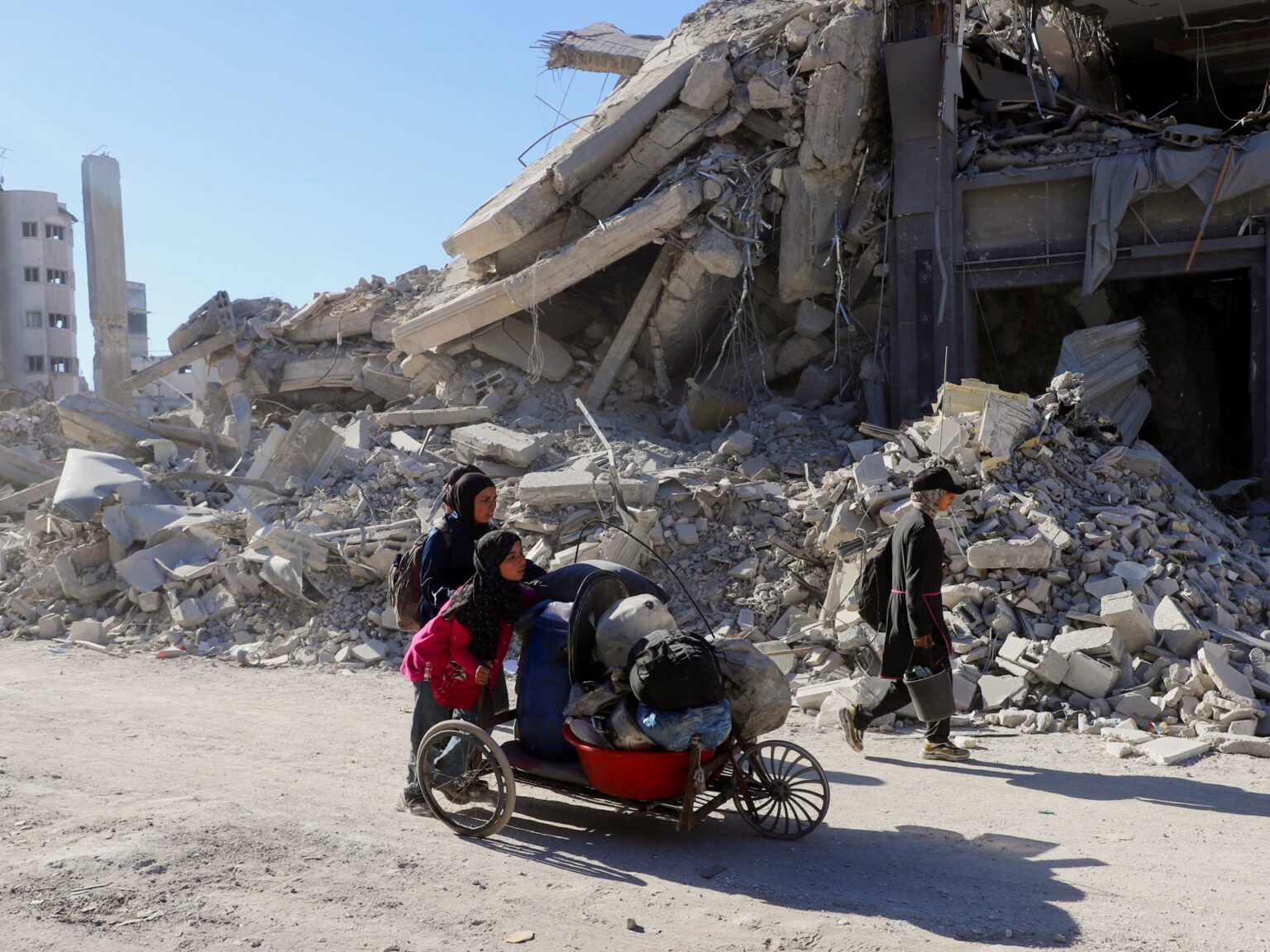Israel has again delayed the reopening of Gaza’s Rafah crossing with Egypt to allow for the movement of people, with Foreign Minister Gideon Saar saying it could be open on Sunday, as Israeli attacks killed at least three Palestinians in southern Gaza.
In a statement on Thursday, COGAT – an Israeli military unit that is responsible for civilian matters in the occupied territory – said coordination was under way with Egypt to set a date for reopening the Rafah crossing for movement of people after completing the necessary preparations.
Recommended Stories
list of 3 itemsend of list
COGAT said the Rafah crossing would remain closed to aid, claiming that the truce deal did not include its reopening. All humanitarian supplies bound for Gaza, it said, would instead pass through the Karem Abu Salem (called Kerem Shalom in Israel) crossing after Israeli security inspections.
Italian news agency ANSA quoted Israel’s Foreign Minister Gideon Saar as saying Rafah will probably be reopened on Sunday, without providing more details.
The crossing was due to be opened on Wednesday under the terms of the Israel-Hamas ceasefire agreement that took effect last week.
For Palestinians in Gaza, the Rafah crossing was long the only connection to the outside world and also the only exit that was not directly controlled by Israel. Last May, Israeli forces raided the crossing, seized control of it and razed its buildings.
For the first time in 20 years, Israeli forces directly controlled the border crossing and deployed soldiers all across the Philadelphi Corridor, where they remain today.
As part of the US ceasefire deal, which calls for their gradual withdrawal, Israeli forces remain in approximately 53 percent of Gaza, including most of Rafah, raising questions about its use.
Seventy million tonnes of rubble
Following the ceasefire deal last week, the United Nations said there has been little progress in aid deliveries into Gaza and that assistance must enter at scale to meet urgent humanitarian needs.
With famine conditions present in parts of Gaza, UN Undersecretary-General for Humanitarian Affairs Tom Fletcher said on Wednesday that thousands of aid vehicles would now have to enter Gaza weekly to ease the crisis, with medical care also scarce and most of the 2.2 million population displaced.
UNICEF spokesperson Tess Ingram told Al Jazeera Palestinians in northern Gaza are in “desperate need” of food and water as thousands have returned to total destruction.
Speaking to Al Jazeera from the al-Mawasi area in the south of the Gaza Strip, Ingram said that in order to scale up humanitarian aid deliveries, multiple crossings into the enclave must be opened.
“The stakes are really high,” she said. “There are 28,000 children who were diagnosed with malnutrition in July and August alone, and thousands more since then. So, we need to make sure it’s not just food coming in, but malnutrition treatments, as well.”
Gaza’s Government Media Office said the aid that had entered since Israel’s assault partially subsided was a “drop in the ocean”.
“The region urgently requires a large, continuous and organised inflow of aid, fuel, cooking gas, and relief and medical supplies,” it said in a statement.
In a separate statement, the office also said that as many as 70 million tonnes of rubble and debris litter the territory after Israel’s two-year bombardment.
“This rubble includes thousands of homes, facilities, and vital infrastructures,” it said. “The process of removing this massive rubble faces severe obstacles, most notably the lack of heavy equipment and machinery due to the Israeli occupation’s ban on their entry, the complete closure of border crossings, and the deliberate prevention of bringing in the materials and machinery necessary to recover the bodies of victims,” it added.
Israeli violations continue
The statement comes after Israel imposed new restrictions on aid entering Gaza earlier this week and postponed reopening the Rafah crossing, accusing Hamas of being too slow in returning the rest of the deceased captives.
The group says it has handed over all bodies it could recover. The armed wing of Hamas said the handover of more bodies in Gaza, reduced to vast tracts of rubble by Israel’s bombardment, would require the admission of heavy machinery and excavating equipment into the blockaded enclave.
On Thursday, a senior Hamas official accused Israel of flouting the ceasefire by killing at least 24 people in attacks since Friday, and said a list of such violations was handed over to mediators.
“The occupying state is working day and night to undermine the agreement through its violations on the ground,” he said.
According to Gaza’s Health Ministry, the bodies of 29 people killed in Israeli attacks have arrived at the enclave’s hospitals in the last 24 hours. This includes 22 bodies recovered from under rubble, three who succumbed to their wounds, and four people killed in new Israeli attacks.
At least three people were killed in Israeli air strikes in eastern Khan Younis on Thursday, according to the official Palestinian news agency WAFA.
The health ministry also said the bodies of 30 Palestinians killed during the war were returned on Thursday, taking the number of bodies it has received since Monday to 120.
Authorities in Gaza say the bodies exhibit signs of torture, including hanging and rope marks, bound hands and feet, and gunfire at close range.
The bodies – dozens of which have yet to be formally identified – showed “conclusive evidence of field executions and brutal torture”, the office said.
“We call for the urgent establishment of an independent international commission of inquiry to investigate these heinous crimes and to hold Israeli leaders accountable for the war crimes committed against our people in the Gaza Strip,” Gaza’s media office said.
https://www.aljazeera.com/news/2025/10/16/israel-delays-rafah-crossing-reopening-as-gaza-awaits-much-needed-aid-surge?traffic_source=rss


